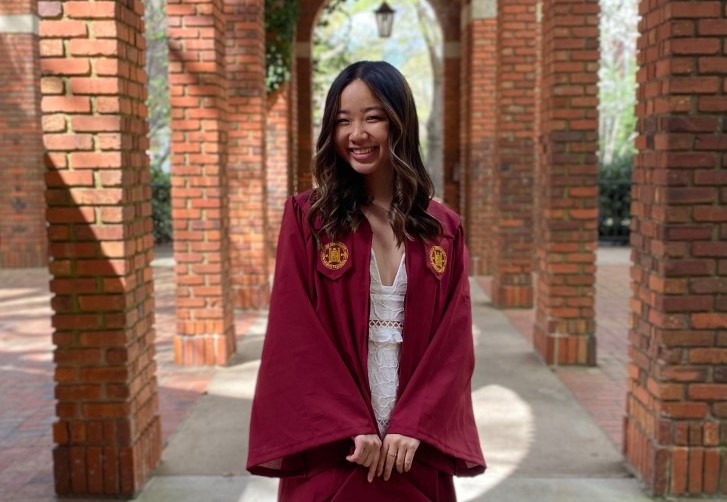In this series, Elon College, the College of Arts and Sciences is shining the spotlight on distinguished members of the Class of 2022 from a wide array of disciplines.
 An Elon College Fellow and Odyssey Scholar, Miso Kim ’22 plans to use her psychology degree to pursue a counseling career.
An Elon College Fellow and Odyssey Scholar, Miso Kim ’22 plans to use her psychology degree to pursue a counseling career.
Kim is the recipient of the Department of Psychology’s 2022 Seena Granowsky Outstanding Psychology Student Award, and served as a member of Psi Chi Honor Society, a member of the department’s diversity, equity and inclusion research task force called R.E.S.P.E.C.T. (Racial Equity for Students of Psychology: Emending our Curriculum and Teaching). She volunteered as a Korean translator with the Elon Academy and worked as an assistant in the financial aid office all four years.
What made you want to become a psychology major?
Fun fact, Elon was the only school I applied to as a psychology major as the university does not offer a criminal justice studies major. However, I am glad that fate worked in the way that it did because I found my passion to help others by being an empathetic and active listener. I also find it intriguing how psychology principles are interwoven through every aspect of life and how applicable the course content is in my personal life.
Tell us about your undergraduate research.
My research is in how Korean and Korean-American parents support early childhood numeracy. I selected this topic because I knew from personal experience and identity as a Korean-American, I wanted to do research within my cultural population. I wanted to know if my personal experiences growing up and learning math were unique to me or something that could be generalized to a population at large. I presented my research at conferences such as World Class Day 4, SURF, Mathematical Cognition Learning Society (MCLS), Southeastern Psychological Association (SEPA) and National Conference on Undergraduate Research (NCUR).
Who was your mentor and how did they shape your scholarship?
My research mentor, Dr. Maureen Vandermaas-Peeler, and I have worked together for the past three years on my undergraduate research. My project would not have come to fruition without her guidance. She advised me countless times on how to scientifically write and critically think. She also has been a listening ear in times of crisis and has advised me on my post-graduate endeavors. My Elon experience would not be the same without her.
What are your plans after Elon?
After graduation, I will be pursuing my master’s in human development counseling on the clinical mental health counseling track.
What was the most valuable part of your college experience?
The relationships that I have built here at Elon. These relationships have defined my undergraduate career and have opened doors for me personally and professionally in ways that my first-year self could not even dream of. My Odyssey directors Catherine Parsons, Marcus Elliott and Denise Teeters have always been a listening ear and an open door I could rely on when I was stressed out about an assignment or if I had a family emergency.
Dr. Vandermaas-Peeler has helped me grow as a learner and has been an outstanding role model and has exemplified what academic resilience looks like. Dr. Iselin has opened up within me the spark to be an active change in the community and always listens to my stream of consciousness thoughts as we brainstorm about how we can bridge the gaps identified in the psychology department. The Financial Aid counselors and my co-workers at the Financial Aid Office wholeheartedly supports and congratulates me on every endeavor I pursue.
Without these relationships, I would not have been able to grow into the person I am today or pursue the professional goals I intend to achieve after Elon.
What advice would you give other Elon students?
I was asked this question when I was interviewed for The Edge Magazine as a first-generation college student my first year. My advice four years later remains the same for future Elon students and first-year students: do not be afraid to ask for help.
The ability to ask for help and seeking out resources around you not only demonstrates a willingness to learn but is also a strength, not a weakness. So, send that email to a professor that you may believe might not know you very well in class, and tell them that you want to pursue research with them. Seek guidance from the Student Professional Development Center, writing center and tutoring services.
Ask for help. You cannot achieve great things and be successful with your willpower alone.


